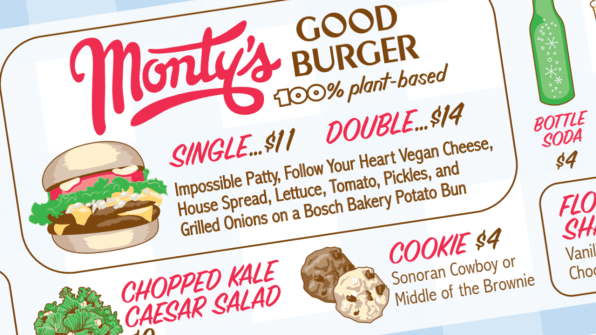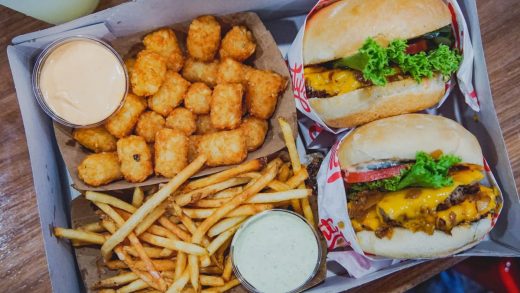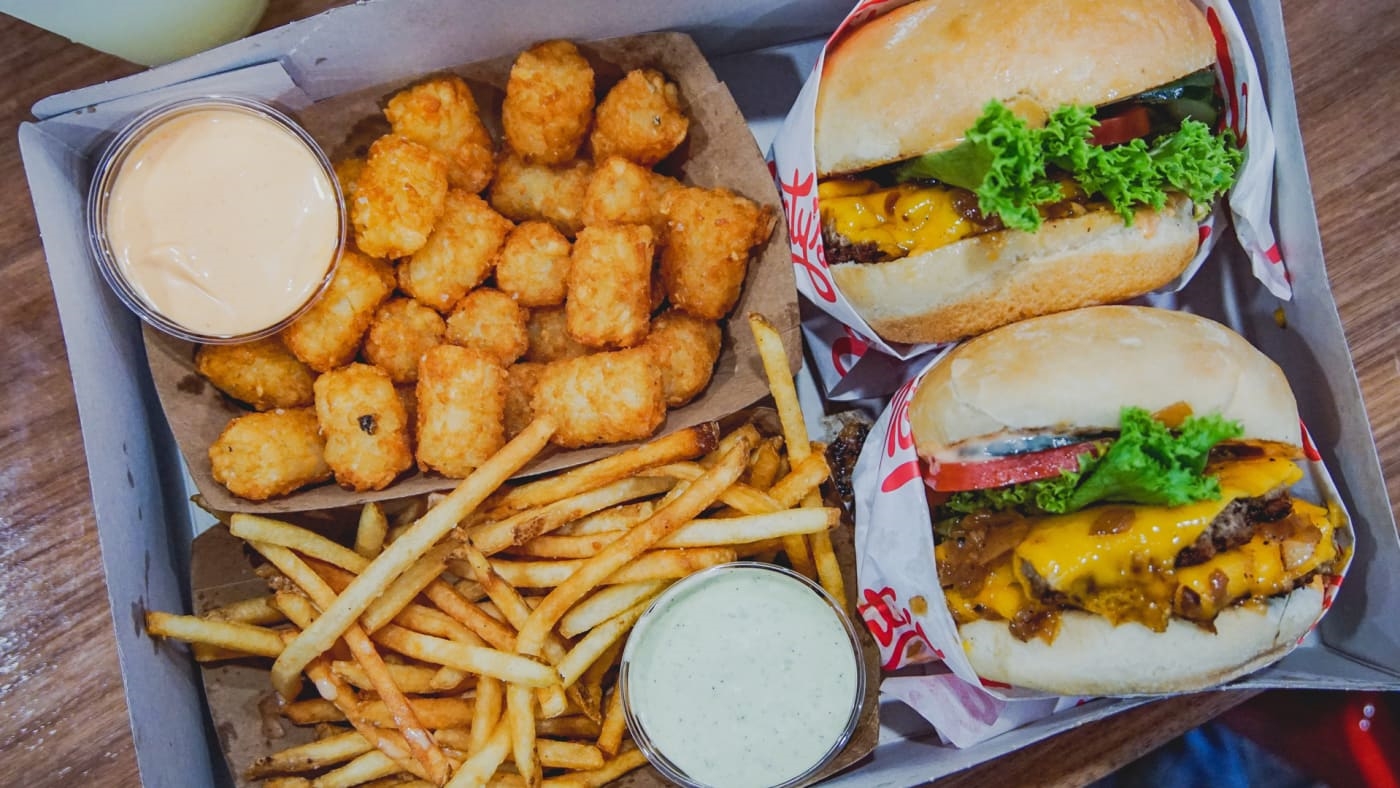The In-N-Out of meatless-burgers? Monty’s beckons curious carnivores
At any other burger joint opening in Los Angeles, a long line for the opening of yet another outpost for America’s favorite food would barely raise an eyebrow.
This past Saturday, that was the scene again at the grand opening of Monty’s Good Burger, in the city’s Koreatown section. There was one huge difference, though: Everything on the menu, including the burger, is vegan.
Monty’s gained cult status with its pop-up stands at several major festivals, including Coachella, where fans gushed over its juicy creations using plant-based Impossible Burger patties on Bosch Baking potato buns, topped off with vegan cheddar, a house-made Thousand Island sauce, and fresh snappy pickles.
“It’s been said that [the burger] reminds people of In-N-Out,” says cofounder Nic Adler. (He wouldn’t know–he’s been vegan for more than two decades.)

Monty’s first brick-and-mortar venture is yet another big bang in the meatless product explosion. Nielsen reports that plant-based sales account for 20% of food and beverage dollars spent by Americans, with beef alternatives making up 44% of that. Impossible Foods (which produces Impossible Burgers) is amping up for increased demand: The brand’s Oakland facility will soon produce 500,000 pounds of “meat” each month to satisfy demand from the 3,000-plus restaurants it now serves.
Monty’s 100% plant-based menu serves more than just the burgers, including tater tots, kale Caesar salad, and grilled cheese–all made with locally sourced ingredients within a 30-mile range. There are, of course, more sinful indulgences for sale: soda made with pure cane sugar and shakes blended with Klein’s nondairy ice cream, among them.
The small, counter-heavy space is outfitted with compostable dining ware, straws, and cups, and all employees are paid above minimum wage at $15 an hour.
Monty’s is the creative collaboration of several entrepreneurs who can attest to fast, tasty food–and millennial-catnip design. Music and food festival producers Nic Adler and Bill Fold regularly put together impressive dining lineups at their massive Goldenvoice events such as Eat Drink Vegan, Coachella, Desert Trip, and Arroyo Seco. (Adler serves as the culinary director for Coachella.) They’re joined by Erin and Derric Swinfard of digital print and design company Monster Media, and Dirk and Amy Alton of Best Beverage Catering service, which works on Coachella.
It is not the first concept of its kind; Amy’s Kitchen–maker of organic vegetarian and vegan foods–opened the country’s first meat-free fast-food restaurant in 2017. L.A. also boasts plenty of vegan restaurants that run the gamut of cuisines. Adler concedes that the city doesn’t necessarily “need” another vegan spot, rather he hoped to draw more people to meatless eating by way of the Impossible Burger.
“We felt like the Impossible Burger has that ability to change people,” Adler says of the decision to base the menu on the popular patty. “So, we started with this idea of: How can we make the best burger–a burger that nobody could put down, that nobody could say–whether they were vegan or not–that this burger wasn’t great?”
Can Veganism Be Fun?
The heme-based creations are so good, Adler says, they can potentially convert die-hard carnivores. But exposure is dependent on experience, and one that offers the products in a cheerful, carefree, and convenient setting. To that end, the Monty’s team started with the word “fun” and designed a memorable retro space with bright blue and red hues, along with a logo that harkens back to Happy Days. The storefront and materials all display a smiling shaggy dog (modeled after co-owner Bill Fold’s own pup) happily biting into a bursting burger.
It’s like a smaller, more intimate Johnny Rocket’s, but with the ability to watch the short order chef flip some faux-meat. “We didn’t want to take ourselves too seriously,” explains Adler. ” We want to make veganism fun.”
Though only a week since its soft opening, the eye-popping storefront lured in plenty of Koreatown passersby who wouldn’t otherwise notice the fine print posted on the order counter: 100%-plant based. Adler says he’s seen many people realize “something might be different” halfway through their order: “I was there the other day, and someone looked over to their friend and was like, ‘Is this is it supposed to be like vegetarian or something?’”
Monty’s invites such double-takes. The eatery wants clients to stumble over, try something new, and maybe give meatless burgers a chance. “Confusion is actually not a bad thing for us, especially if that person is a meat eater,” says Adler. “What we were hoping for is a little more openness.”
Adler learned this firsthand at this past year’s Coachella, where he learned the advantages of setting. If you put consumers in an exciting, beautiful environment, they’re more prone to try something new, he explains. Within a day, Monty’s Good Burger went viral at the music festival, both on the festival grounds and on social media. And not just with vegans, but with a wide swath of attendees who didn’t otherwise associate themselves with meatless-meat.
Monty’s ultimate goal is to introduce the burger to newbies and the curious. The vegans, says Adler, are already going to come, “but to be successful–and not only financially successful, but being able to open Monty’s all over–it’s going to take people that are not normally eating this food saying, ‘I’ll be back tomorrow [because] that’s the best burger I’ve ever had.’ We’re not at all going for ‘this is the best plant-based burger I’ve ever had.’”
Still, Adler concedes it’s not always as simple as masking veganism in a cute storefront. Goldenvoice featured Monty’s at the Stagecoach country music festival in April, where folks were a “little more into their meat,” says Adler. Though they had some success, overall the reaction was far from that of Coachella: “Some people were a little shocked . . . there’s a lot of aversion to the words plant-based or vegan. They feel very strongly about it.”
Monty’s made appearances at other music festivals, such as Arroyo Seco, which gave the budding brand time to hone their back-of-house operations. The team fine-tuned their ability to keep up with volume, perfect cooking times, and provide service in a timely fast-food manner.
What started as a side project turned more serious after the team saw the cumulative popularity. L.A. is just the first outpost of what Monty’s hopes to achieve nationwide, which is changing Americans’ meat consumption habits.
The PETA kerfuffle
That Monty’s depends on the Impossible Burger, however, does present its own challenges. Monty’s positioned itself as a vegan, ethical company, which could potentially conflict with Impossible Foods down the line. Animal rights organizations such as PETA protested the burger-maker after it was discovered that rats were fed large amounts of the patty’s key ingredient, heme, for FDA approval. (Impossible Foods CEO Pat Brown called it an “agonizing” decision that was essential for the company’s ultimate goal of reducing animal consumption.)
Adler says Impossible Foods adequately handled the controversy in explaining the reasoning for animal testing–to gain FDA approval. It’s unlikely he will consider another patty on the market. For Monty’s to succeed, he believes, it needs at its core a “game-changing” patty such as the Impossible Burger.
“We feel like if we can create something that can pull people away from one or two [meat] burgers a week for the rest of their life, then we’re going to go with a product that we feel we can stand behind,” he says.
Adler and his cofounders are not yet mapping out expansion, instead focusing on harnessing the brand before committing to a next stop. But bringing Monty’s to markets across the U.S. is definitely a goal–and not one he in any way feels intimidated by.
“That’s the great thing with Monty’s: It’s not very complicated–it’s a burger,” says Adler. “And every town in America needs a good burger.”
(81)



